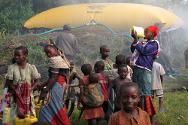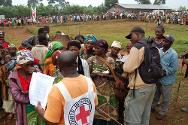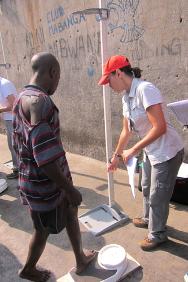DR Congo: grave concern over wounded in Goma
20-11-2012 Operational Update
The fighting in recent days in and around the North Kivu capital of Goma has raised fears over the welfare of the most vulnerable members of the population. The International Committee of the Red Cross (ICRC) is working hard to come to the aid of people wounded in the fighting as well as people driven from their homes by the hostilities and those being detained.
"Our first concern is the wounded, people who have been arrested, and the thousands of people whose homes are in the areas affected by the fighting," said Franz Rauchenstein, head of the ICRC's delegation in the country. The government forces and armed groups engaged in the hostilities were, he said, obliged to take all possible precautions in their choice of methods and means of warfare to spare the civilian population and civilian infrastructure.
In addition, hospitals and other health-care facilities must be spared and allowed to carry out their work, as must ambulances and their crews. Every sick or wounded person, Mr Rauchenstein stressed, was entitled to care in strict accordance with his or her medical need. The red cross emblem must be respected and protected.
The recent intensification of fighting in North and South Kivu had forced a huge number of people to flee their homes. Many of them, he pointed out, were living in extremely difficult conditions.
The ICRC is doing its utmost to come to the aid of displaced people and other particularly vulnerable individuals. These include children separated from their families, injured people and detainees.
Helping the injured and displaced
An ICRC surgical team has since last week been helping staff at Goma's N'Dosho hospital deal with the influx of war-wounded people. Two operations were performed on Saturday but nothing since owing to poor security conditions. The five operations scheduled for today had to be cancelled. In recent days the ICRC has also taken nine injured people to hospital.
On Monday, drinking water was distributed to almost 4,000 people who had fled their homes and sought refuge in the Don Bosco transit camp for unaccompanied children, in Goma.
Volunteers of the Red Cross Society of the Democratic Republic of the Congo on Monday joined a group of people, including 30 unaccompanied children, who had fled fighting around Kanyaruchniya camp just north of Goma. The volunteers were guiding them to Mugunga camps 1 and 3, about 20 kilometres to the south, but had to break off the operation when the security situation worsened.
Food aid for 1,200 detainees
A week's supply of food and coal was delivered on Monday to 1,200 detainees in Goma prison. "Detainees are particularly vulnerable,” explained Mr Rauchenstein. “When fighting approaches or reaches urban areas, the prison authorities often struggle to maintain decent living conditions for the detainees."
Acute needs in other areas
As events unfold in Goma, people in South Kivu are also in dire need of assistance. "We’re having to take war-wounded patients to hospital every day," said Mr Rauchenstein. "Meanwhile, the wider population – already weakened by months of conflict – is facing food shortages." On top of the logistical challenges, he explained, the main difficulty was negotiating with such a wide range of armed forces and groups in order to gain access to areas where people need the ICRC's help.
Since the beginning of October, the security situation has deteriorated sharply in the districts of Ituri and Haut-Uélé in Orientale province, bringing to an end the lull in violence since June. The last two months have been marked by a rise in security incidents in this part of the country. The recent attacks in the Bangadi region in particular have struck fear into communities that have endured acts of extreme violence for years.
Since early October, the ICRC has also:
- taken 50 war-wounded patients to hospital;
- worked with volunteers from the National Red Cross Society to distribute food to 49,000 displaced people (some in the Walikale region of North Kivu), many of whom also received essential household items such as tarpaulins to protect their makeshift shelters during the current rainy season;
- regularly checked the food supplies in several prisons and lock-ups, called upon those responsible to take action, and run therapeutic feeding programmes for malnourished detainees. The ICRC has also continued supplying basic medicines to several prisons and carried out several urgent projects to improve their water supply and sanitation conditions.
- reunited more than 850 unaccompanied children and demobilized child soldiers with their families and monitored more than 500 children reunited with their families since the start of the year;
- helped more than 100 civilians and soldiers wounded in the fighting to receive physical rehabilitation.
For further information, please contact:
Annick Bouvier, ICRC Kinshasa, tel: + 243 81 700 85 36
Jean-Yves Clemenzo, ICRC Geneva, tel: +41 22 730 22 71 or +41 79 217 32 17


